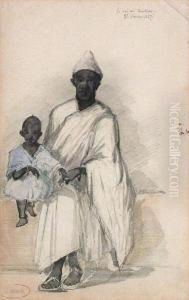Emile D. Roux Paintings
Émile Duclaux (known as Émile D. Roux) was a prominent French physician, bacteriologist, and immunologist, whose work in the late 19th and early 20th centuries contributed significantly to the fields of microbiology and public health. Born on December 17, 1853, in Confolens, Charente, France, Roux was not an artist in the traditional sense of painters or sculptors, but his artistic mastery was evident in the scientific arena, where he pioneered techniques and discoveries that have saved countless lives.
Roux's interest in the biological sciences led him to join the newly established Institut Pasteur in Paris, where he became one of Louis Pasteur's closest collaborators. Together, they worked on developing vaccines and understanding the mechanisms of infectious diseases. One of Roux's most notable contributions was his work on the diphtheria toxin. In the 1880s, he demonstrated that the disease was caused by a toxin produced by the bacterium Corynebacterium diphtheriae. This discovery was instrumental in the development of the diphtheria antitoxin, the first major success in antitoxin therapy, which significantly reduced the mortality rate from the disease.
In addition to his work on diphtheria, Roux investigated other infectious diseases, such as tuberculosis and syphilis, and he was involved in the development of vaccines against rabies. His research extended to the study of sterilization techniques, and he was an advocate for the use of serums and vaccines to prevent and treat infectious diseases. Roux's contributions to medical science were recognized internationally, and he received numerous awards and honors for his work.
Beyond his scientific achievements, Émile D. Roux was also a dedicated educator and administrator. He served as a professor at the Institut Pasteur, where he trained a generation of scientists in the methods of microbiology and immunology. In 1904, he succeeded Louis Pasteur as the director of the Institut Pasteur, a position he held until his death on November 3, 1933. His leadership helped establish the institute as a world-leading center for medical research. Roux's legacy is not only in his scientific discoveries but also in his role in fostering the development of microbiology and immunology as disciplines. His work laid the foundation for modern medical research and the ongoing fight against infectious diseases.

